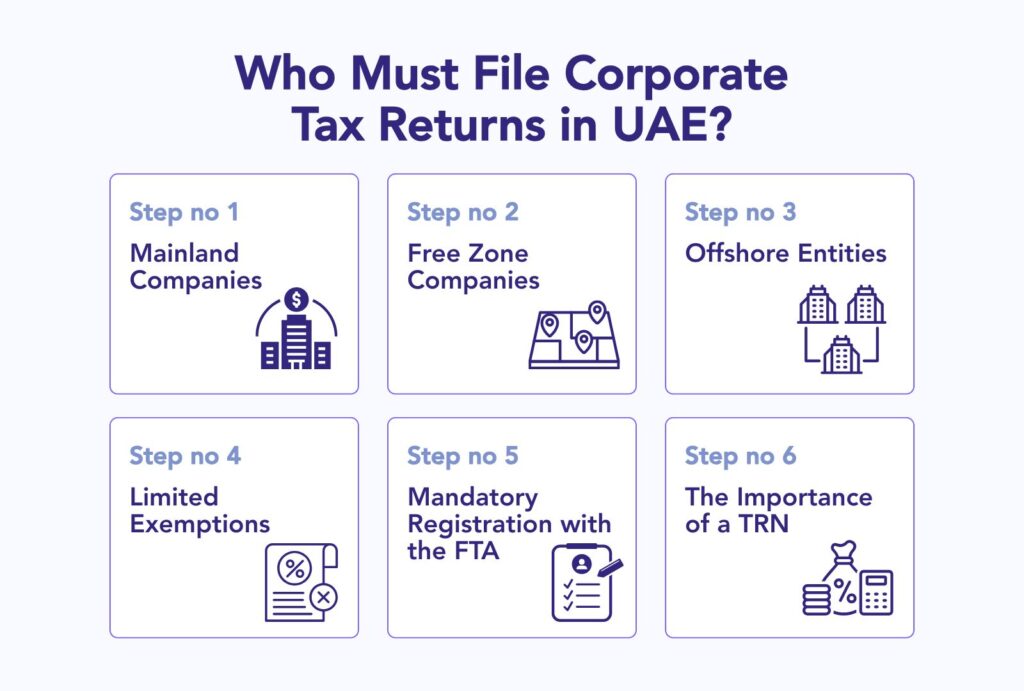Ultimate Checklist for Corporate Tax Return Filing in UAE 2025
Corporate tax is now part of doing business in the UAE. In 2025, it’s not just about profit — it’s about staying compliant. The new corporate tax regime was rolled out to keep the UAE in line with global standards. It aims to build a fair, transparent business environment that attracts investment and keeps the economy strong.
Most UAE businesses will have to file their tax returns for the 2025 tax period. Key point: your filing deadline is nine months after your financial year ends. For many, that means 30 September 2025. Payment is due on the same date.
So why does this matter?
Timely and accurate filing protects you from penalties and unnecessary costs. But it’s more than money — non-compliance can damage your reputation. And in a competitive market like the UAE, trust is everything.
This checklist will help you get it right. No last-minute panic. No costly mistakes. Just a clear plan to keep your business fully compliant.
Who Must File Corporate Tax Returns in UAE?

Not sure if corporate tax applies to you? Here’s what you need to know — no guesswork.
Mainland Companies
If you run a mainland company, corporate tax applies to you. Full stop. All taxable income above the threshold is subject to the UAE’s 9% corporate tax rate. You must register with the Federal Tax Authority (FTA), file your tax return every year, and pay what you owe on time.
Free Zone Companies
Free Zone businesses are not exempt from filing just because they enjoy tax incentives.
Many Free Zone companies still qualify for the 0% corporate tax rate on qualifying income — but you still need to file a return. Failing to meet Free Zone conditions can remove your 0% benefit. So don’t risk it. Keep your records clean and submit your return each year.
Offshore Entities
Offshore companies can’t hide under the radar anymore. If your business is effectively managed and controlled from the UAE — for example, if your decision-making happens here — you may need to register and file. Offshore doesn’t always mean “off the hook.” Always check your specific setup.
Limited Exemptions
There are some exemptions — but they’re strict. Entities like certain government bodies, qualifying investment funds, or approved public benefit organisations may be exempt from corporate tax. But don’t assume you qualify. Check the FTA rules and get professional advice if needed. A simple oversight can cost you penalties later.
Mandatory Registration with the FTA
If your taxable income is above AED 375,000, you must register with the FTA. This isn’t optional. If you don’t register on time, you risk fines, compliance headaches, and delays in filing.
The Importance of a TRN
When you register, you’ll get a Tax Registration Number (TRN). This is like your business ID for all corporate tax matters. No TRN means you can’t file your tax return. Worse, it can raise red flags with the FTA. Keep your TRN safe, up to date, and handy — you’ll need it for all your tax dealings.
Checklist for Corporate Tax Return Filing
I. Confirm Registration & TRN
Make sure you’re registered with the Federal Tax Authority (FTA) on EmaraTax. Check that you have a valid Tax Registration Number (TRN). No TRN, no filing.
II. Verify Financial Year & Filing Deadline
Know your company’s financial year. Is it Jan–Dec? Confirm it’s updated with the FTA. Remember: your corporate tax return is due within 9 months after your year ends.
III. Finalize Financial Statements
Prepare your financial statements under IFRS standards. Get them audited if your revenue is over AED 50 million — or if you’re a Free Zone entity. Match everything with your VAT records. No surprises.
IV. Determine Taxable Income
Start with your net profit (from IFRS statements). Adjust for non-deductible expenses, exempt income, and unrealized gains. Use any reliefs you qualify for — Small Business Relief, Free Zone 0% rate, Group Relief.
V. Calculate Tax Payable
In tax UAE scenario, 0% tax on the first AED 375,000. 9% tax on anything above that. Apply all your elections properly in EmaraTax.
VI. Gather Required Documents
Trade license, audited accounts, VAT returns. Transfer pricing docs if needed. Foreign income records, depreciation schedules, related party transactions. Keep them tidy.
VII. Reconcile Across Tax Systems
Cross-check your corporate tax return with your VAT returns and audit reports. Make sure the numbers line up. Mistakes attract penalties.
VIII. Interest & Losses Adjustment
Prepare interest limitation schedules (30% of EBITDA or AED 12 million cap). If you have tax losses to carry forward, include full details.
IX. Setup Payment Channels
Link your bank account to EmaraTax. Make sure funds are ready before the due date. Keep the payment confirmation for your records.
X. File and Submit Online
Log in to EmaraTax. Complete your return carefully. Upload all the documents. Double-check everything. Submit before the 9-month deadline.
XI. Maintain Records for 7 Years
Keep all tax files, payment slips, financials, and any FTA letters for at least 7 years. Store them safely — you may need them.
XII. Audit Readiness & FTA Preparedness
Be ready for an FTA review anytime. Have all supporting docs organized. Keep related party and transfer pricing files complete and easy to share.
Special Considerations for Different Business Types

Different types of businesses have specific considerations. If you are buying a business, these are specially important, Lets see what they are:
Mainland vs. Free Zone vs. Offshore
Not every business files the same way. Mainland companies follow the standard corporate tax rules. All taxable income is subject to the 9% rate of UAE income tax above the threshold.
Free Zone companies may still get the 0% rate on qualifying income — but don’t get comfortable. You still have to file your return and prove you meet all the conditions. One slip and the 0% can be lost.
Offshore entities? It depends. Many must register and report if they’re effectively managed and controlled from the UAE. Always double-check — assumptions can cost you big time.
Each business type must keep records that match its structure and tax position. So get your documents in order.
Small Businesses and Relief Options
Running a small business? The UAE offers Small Business Relief — but it’s not automatic.
You may qualify if your revenue is AED 3 million or less for the relevant tax period.
If you’re eligible, you can claim relief through EmaraTax — but you still have to register, file, and keep records.
No shortcuts. Keep your financials clean and clear. If you grow past the threshold, you must pay up.
How ADEPTS Can Help
Tax compliance can feel like a maze. That’s where we come in.
Expertise in Corporate Tax Compliance
At ADEPTS, we guide UAE businesses through every step. From registration to tax filing and staying audit-ready. Our team knows the rules. And we tailor our advice to fit your business, whether you’re mainland, Free Zone, or offshore.
Comprehensive Tax Solutions
We don’t just tick boxes. We help you plan ahead, for complex areas like ICV scoring, joint ventures, acquisitions, or group relief. No surprises. No costly mistakes. We handle the details so you can stay focused on what you do best — running and growing your business.



